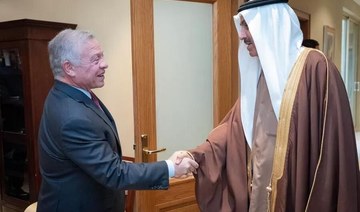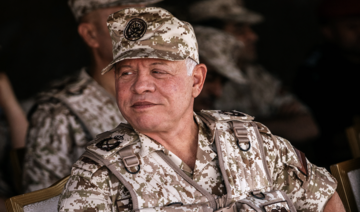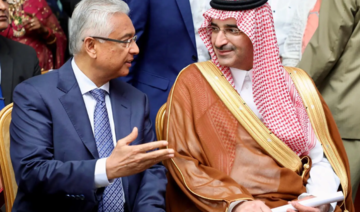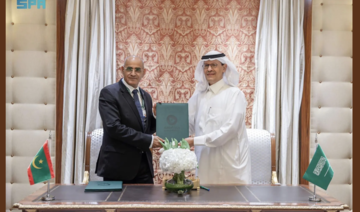LONDON: Britain and Jordan have air-dropped four tons of aid including medicines, fuel and food to Tal Al-Hawa Hospital in northern Gaza, Britain’s Foreign Office said on Wednesday.
The UK-funded aid was delivered by the Jordanian Air Force.
“Thousands of patients will benefit and the fuel will enable this vital hospital to continue its life-saving work,” British Foreign Secretary David Cameron said in a statement.
“However, the situation in Gaza is desperate and significantly more aid is needed, and fast. We are calling for an immediate humanitarian pause to allow additional aid into Gaza as quickly as possible and bring hostages home.”
UK and Jordan air drop aid to hospital in northern Gaza
https://arab.news/n6mfq
UK and Jordan air drop aid to hospital in northern Gaza
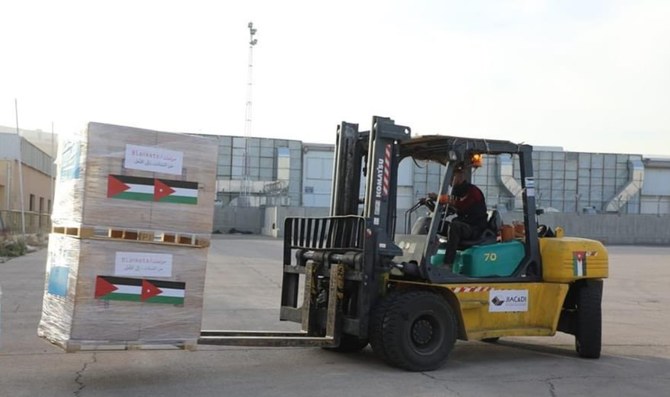
- The UK-funded aid was delivered by the Jordanian Air Force
UAE, Mauritius sign MoU to boost energy cooperation

- Two sides will exchange expertise and information on emerging technologies, best practices and knowledge-sharing
DUBAI: The Emirati Ministry of Energy and Infrastructure and the Mauritian Ministry of Energy and Public Utilities inked a memorandum of understanding on Monday aimed at bolstering collaboration across water, energy and sanitation sectors, Emirates News Agency reported.
The agreement outlines a broad spectrum of cooperation, encompassing energy, renewable energy, hydrogen and its derivatives, energy efficiency, liquefied natural gas and water management.
Also under the agreement, cooperation will also take place in the water efficiency, desalination, digital technology applications, wastewater treatment and sanitation sectors.
Under the MoU, the two sides will exchange expertise and information on emerging technologies, best practices and knowledge-sharing.
They will also explore joint research and development initiatives and implement projects using public-private partnership and independent power producer models.
The agreement also facilitates joint visits, meetings and technical workshops, while encouraging bilateral investment in relevant sectors.
“This MoU cements the longstanding relations between the UAE and Mauritius and serves their shared commitment to sustainable development and environmental protection. The UAE follows a collaborative approach to meet the targets of the UAE Energy Strategy 2050, the National Hydrogen Strategy 2050, and the UAE Water Security Strategy 2036, which collectively contribute to the UAE’s net zero by 2050 target,” said Suhail bin Mohammed Al-Mazrouei, Emirati minister of energy and infrastructure.
Georges Pierre Lesjongard, Mauritian minister of energy and public utilities, thanked the UAE for the longstanding collaboration between the the emirates and Mauritius in various sectors.
He said that the cooperation played a pivotal role in advancing Mauritius’s goals outlined in its nationally determined contributions and in enhancing resilience against the impacts of climate change, particularly for Mauritius as a small island developing state.
Doctors treat Sharjah school teacher with rare nerve disease

DUBAI: Doctors in a Sharjah hospital helped a 46-year-old resident undergo treatment for a debilitating nerve disease that prevented her from walking.
Annie Cherian, a school teacher from India and living in Sharjah, experienced weakness in her limbs six months ago and her condition quickly worsened, making daily life tasks like brushing her hair or even walking increasingly difficult.
On April 3 Cherian sought help from doctors at Aster Hospitals in Sharjah and within two days received a CIDP diagnosis, a condition that affects approximately 1-2 people in 100,000 annually according to the CIDP Foundation International.
CIDP, or Chronic Inflammatory Demyelinating Polyneuropathy, is a rare autoimmune nerve disease that attacks the covering of the nerve cells and leads to loss of physical strength and sensation in the arms and legs. It can be caused by a virus or infection that enters the body.
Usually CIDP is treated with steroids, but as Cherian is also a diabetic, this option was not viable as it might worsen her diabetes, explained Dr. Rajesh Chaudhary, specialist neurologist at Aster Hospital Sharjah.
With the help of Chaudhary and his medical team, Cherian underwent an intravenous treatment which lasted five days.
The treatment involved introducing antibodies through the vein, which helps existing antibodies in the body to strengthen and fight off infections and diseases, Chaudhary explained.
“Without proper treatment, a patient’s quality of life becomes very poor and they struggle to do mundane everyday tasks,” said Chaudhary.
Other symptoms of CIDP include problems walking, lack of strength, tingling and pain in the limbs, he said.
Cherian responded well to the treatment and regained strength in her limbs, and is now able to perform everyday tasks unassisted.
Chaudhary said Cherian is expected to lead a normal life after the treatment and will most likely not experience weakness or fatigue in her limbs again.
“I am so grateful for the medical team who helped me recover remarkably and restore my strength, but also made me aware of autoimmune disease’s impact and the importance of timely medical intervention,” said Cherian.
Israeli forces push into Gaza from north and south

- Some of the most intense fighting for weeks now taking place on both the northern and southern edges of Gaza
- Hundreds of thousands of Palestinians again take flight and aid groups warn humanitarian crisis could worsen
CAIRO: Israeli forces pushed deep into the ruins of Gaza’s northern edge on Monday to recapture an area where they had claimed to have defeated Hamas months ago, while at the opposite end of the enclave tanks and troops pushed across a highway into Rafah.
With some of the most intense fighting for weeks now taking place on both the northern and southern edges of Gaza, hundreds of thousands of Palestinians have again taken flight, and aid groups warn that a humanitarian crisis could sharply worsen.
Israel described its latest return to the north, where it pulled out most of its troops five months ago, as part of a “mop-up” stage of the war to prevent fighters from returning, and said such operations had always been part of its plan. Palestinians say the need to keep fighting amid the ruins of previous battles is proof Israel’s military objectives are unattainable.
In sprawling Jabalia, the biggest of Gaza’s eight camps built 75 years ago to house Palestinian refugees from what is now Israel, tanks pushed toward the heart of the district. Residents said tank shells were landing at the center of the camp and air strikes had destroyed clusters of houses.
Thick clouds of black smoke from explosions could be seen rising over northern Gaza from the Israeli border on Sunday.
Israeli troops are seeking to wipe out Hamas, which has said it is committed to Israel’s destruction. The militant group burst into Israel on Oct. 7, killing 1,200 and taking more than 250 hostages, by Israeli tallies.
The Palestinian death toll in the war has now surpassed 35,000, according to Gaza health officials who fear many more bodies are lost under the rubble. The fighting has laid waste to the coastal enclave and caused a deep humanitarian crisis, with the Gaza health ministry warning in a statement on Monday that the medical system is on the verge of collapse due to a shortage of fuel to power generators and ambulances.
Palestinian health officials on Monday said they had so far recovered 20 bodies of Palestinians killed in the overnight air strikes on Jabalia, while dozens were injured.
At the opposite end of Gaza in Rafah, against the border fence with Egypt, Israel stepped up aerial and ground bombardments on the eastern areas of the city, killing people in an air strike on a house in the Brazil neighborhood.
Israel ordered residents out of the east of the city last week, and extended that order to central areas in recent days, sending hundreds of thousands of people, most of whom are already displaced, fleeing for new shelters.
Residents said Israeli air and ground bombardments were intensifying and tanks had cut off the main north-south Salahuddin Road that divides the eastern part of the city from the central area.
“The tanks cut the Saladuddin road east of the city, the forces are now in the southeast side, building up near the built-up area, the situation is dreadful and the sounds of explosions never stopped,” said Bassam, 57, from the Shaboura neighborhood in Rafah.
“People continue to leave Rafah, even far away near the western areas as no place looks safe now and also because people do not want to escape at the last minute should tanks make sudden incursions and moving out becomes too late,” he told Reuters via a chat app.
UNRWA, the main United Nations aid agency in Gaza, estimated that about 360,000 people had fled the southern city since the Israeli military gave its first evacuation order a week ago.
BOMB SHIPMENT ON HOLD
The assault on Rafah has caused one of the biggest splits in generations between Israel and its main ally the United States, which put some deliveries of weapons on hold for the first time since the war began. Washington has said Israel must not assault Rafah without a plan in place to protect civilians there, which it has yet to see.
Jack Lew, the US ambassador to Israel, signalled on Sunday that the Rafah incursion was still on a scale that Washington considers acceptable.
“The president was clear in the interview he gave the other evening that what Israel has done so far hasn’t crossed over into the area where our disagreements lie,” Lew told Israel’s Channel 12 TV, without elaborating on what that area entails.
“I’m hoping we don’t end up with real disagreement.”
Israeli forces push into Gaza from north and south

- Israel describesd its latest return to the north as part of a ‘mop-up’ stage of the war to prevent fighters from returning
CAIRO: Israeli forces pushed deep into the ruins of Gaza’s northern edge on Monday to recapture an area where they had claimed to have defeated Hamas months ago, while at the opposite end of the enclave tanks and troops pushed across a highway into Rafah.
With some of the most intense fighting for weeks now taking place on both the northern and southern edges of Gaza, hundreds of thousands of Palestinians have again taken flight, and aid groups warn that a humanitarian crisis could sharply worsen.
Israel described its latest return to the north, where it pulled out most of its troops five months ago, as part of a “mop-up” stage of the war to prevent fighters from returning, and said such operations had always been part of its plan. Palestinians say the need to keep fighting amid the ruins of previous battles is proof Israel’s military objectives are unattainable.
In sprawling Jabalia, the biggest of Gaza’s eight camps built 75 years ago to house Palestinian refugees from what is now Israel, tanks pushed toward the heart of the district. Residents said tank shells were landing at the center of the camp and air strikes had destroyed clusters of houses.
Thick clouds of black smoke from explosions could be seen rising over northern Gaza from the Israeli border on Sunday.
Israeli troops are seeking to wipe out Hamas, which has said it is committed to Israel’s destruction. The militant group burst into Israel on Oct. 7, killing 1,200 and taking more than 250 hostages, by Israeli tallies.
The Palestinian death toll in the war has now surpassed 35,000, according to Gaza health officials who fear many more bodies are lost under the rubble. The fighting has laid waste to the coastal enclave and caused a deep humanitarian crisis, with the Gaza health ministry warning in a statement on Monday that the medical system is on the verge of collapse due to a shortage of fuel to power generators and ambulances.
Palestinian health officials on Monday said they had so far recovered 20 bodies of Palestinians killed in the overnight air strikes on Jabalia, while dozens were injured.
At the opposite end of Gaza in Rafah, against the border fence with Egypt, Israel stepped up aerial and ground bombardments on the eastern areas of the city, killing people in an air strike on a house in the Brazil neighborhood.
Israel ordered residents out of the east of the city last week, and extended that order to central areas in recent days, sending hundreds of thousands of people, most of whom are already displaced, fleeing for new shelters.
Residents said Israeli air and ground bombardments were intensifying and tanks had cut off the main north-south Salahuddin Road that divides the eastern part of the city from the central area.
“The tanks cut the Saladuddin road east of the city, the forces are now in the southeast side, building up near the built-up area, the situation is dreadful and the sounds of explosions never stopped,” said Bassam, 57, from the Shaboura neighborhood in Rafah.
“People continue to leave Rafah, even far away near the western areas as no place looks safe now and also because people do not want to escape at the last minute should tanks make sudden incursions and moving out becomes too late,” he told Reuters via a chat app.
UNRWA, the main United Nations aid agency in Gaza, estimated that about 360,000 people had fled the southern city since the Israeli military gave its first evacuation order a week ago.
BOMB SHIPMENT ON HOLD
The assault on Rafah has caused one of the biggest splits in generations between Israel and its main ally the United States, which put some deliveries of weapons on hold for the first time since the war began. Washington has said Israel must not assault Rafah without a plan in place to protect civilians there, which it has yet to see.
Jack Lew, the US ambassador to Israel, signalled on Sunday that the Rafah incursion was still on a scale that Washington considers acceptable.
“The president was clear in the interview he gave the other evening that what Israel has done so far hasn’t crossed over into the area where our disagreements lie,” Lew told Israel’s Channel 12 TV, without elaborating on what that area entails.
“I’m hoping we don’t end up with real disagreement.”
Brief CVs of Kuwait’s newly-formed government

KUWAIT CITY: Kuwait’s government has released the profiles of its new cabinet members, who were installed in office on Sunday.
Prime Minister Sheikh Ahmad Al-Abdullah Al-Sabah:
Born in 1952, Sheikh Ahmad completed his primary studies at Sharqiya School and High School in Lebanon. He holds a Bachelor's degree in Business Administration with a focus on Finance (Banking and Investment) from the University of Illinois, US, obtained in 1976. He began his career at Kuwait's Finance Center until 1978, then moved to the Central Bank of Kuwait until 1987. From 1987 to 1998, he served as the Chairman of the Board for Burgan Bank. In July 1999, he was appointed as Minister of Finance and Minister of Communications. Over the years, he held various ministerial positions including Minister of Planning, Minister of State for Administrative Affairs, Minister of Health, Minister of Oil, and Minister of Information. In September 2021, he was appointed as head of the Diwan of His Highness the Crown Prince.
First Deputy Prime Minister, Defense Minister, and Interior Minister Fahad Yusuf Saud Al-Sabah:
Born in 1959, Fahad graduated from the Kuwaiti military academy and previously served as an Amiri Guard officer. He held positions in the previous cabinet as Deputy Prime Minister, Defense Minister, and Acting Interior Minister.
Deputy Prime Minister and Minister of State for Cabinet Affairs, Shereeda Abdullah Al-Mousherji:
Born in 1952, Shereeda holds a Bachelor's degree in Commerce from Kuwait University and a Master's degree in Business Administration from Harvard University. He served in various roles including Assistant Secretary-General for Administrative, Financial, and Technical Affairs in the National Assembly and Minister of Transportation.
Deputy Prime Minister and Oil Minister, Dr. Imad Mohammad Abdulaziz Al-Atiqi:
Born in 1956, Dr. Al-Atiqi holds a PhD in chemical engineering and previously served in academic roles at Kuwait University.
Minister of Information and Culture, Abdulrahman Bdah Al-Mutairi:
He holds a BA degree in Psychology with a minor in Political Science from Kuwait University. He previously served as Minister of Information, Minister of State for Youth Affairs, and Director General of Public Youth Authority.
Minister of Health, Dr. Ahmad Abdulwahab Al-Awadhi:
He holds a PhD in Pediatrics from the Kuwait Institute for Medical Specialization, a PhD in Medicine from the Arab Gulf University, and a BA in basic sciences. He previously served as Minister of Health in previous cabinets.
Minister of Social Affairs, Labor, Family Affairs, and Childhood, and Minister of State for Youth Affairs, Dr. Amthal Hadi Al-Huwailah:
She holds a Doctorate degree in cognitive psychology and previously served as an Assistant Professor in Cognitive Psychology.
Finance Minister and Minister of State for Economic and Investment Affairs, Dr. Anwar Ali Abdullah Al-Mudhaf:
He holds a PhD in business management and has been the chairman of Kuwait's Al-Ahli United Bank since 2014.
Minister of Electricity and Water, Renewable Energy, and Minister of State Housing Affairs, Dr. Mohammad Abdulaziz Bushehri:
He holds a doctorate in economics and has held various positions including Director at the Kuwait Institute for Scientific Research and Director of the Department of Studies and Capital Markets Development at the Capital Markets Authority.
Minister of Justice and Minister of Awqaf and Islamic Affairs, Dr. Mohammad Ibrahim Al-Wasmi:
He is an Associate Professor of Commercial and Maritime Law at Kuwait University and holds degrees in Law from Kuwait University and London Metropolitan University.
Minister of Commerce and Industry, and Minister of State for Communication Affairs, Omar Saud Al-Omar:
Born in 1966, he holds a Bachelor's degree in Computer Science and has held several administrative positions including CEO of Zain Kuwait.
Minister of Education and Minister of Higher Education and Scientific Research, Dr. Adel Mohammad Abdullah Al-Adwani:
He previously served as a professor in Kuwait University's faculty of Administrative Sciences.
Minister of Foreign Affairs, Abdullah Ali Abdullah Al-Yahya:
Born in 1966, he holds a bachelor's degree in business management and previously served as Kuwait's ambassador to several Latin American countries.
Minister of Public Works and Minister of State for Municipality Affairs, Dr. Nora Mohammad Khaled Al-Mashaan:
She previously served as an Associate Professor in the Department of Civil Engineering at Kuwait University.



